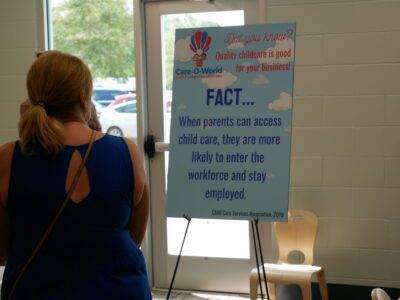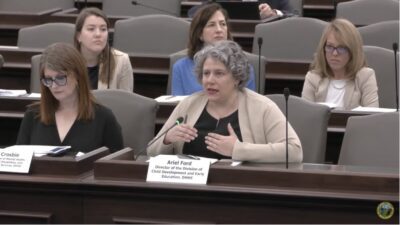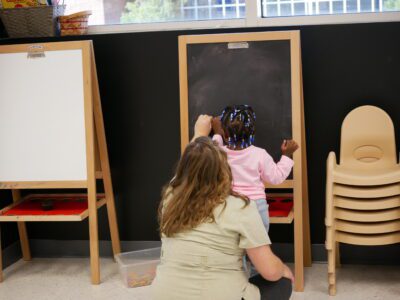
|
|
The first State of the Child Summit, hosted Tuesday by nonprofits NC Child and the North Carolina Institute of Medicine, painted a picture of systems struggling to support the state’s youth.
Experts shared updates on a child care system facing potential mass closures, a child welfare system without adequate resources for vulnerable children, a maternal care system with rural deserts and racial disparities, and an alarming mental health crisis across age groups.
“North Carolina’s children deserve our full attention now,” said Erica Palmer Smith, executive director of NC Child. “We need to understand what they’re going through and what they need from us to be able to lead healthy and fulfilling lives.”
Some bright spots were highlighted throughout the event, including last year’s $835 million state investment in behavioral health, Medicaid expansion, and momentum for public-private child care solutions.
“When I see folks thinking outside the box to solve problems and recognize the issue, I think we’re unstoppable,” said Kody Kinsley, secretary of the Department of Health and Human Services. “That’s the story of Medicaid expansion. That was the story of the behavioral health investment, and that’s going to be the story of investing for children.”
Calls for child care action this session
Cross-sector leaders called for child care investments from the legislature to avoid a financial crisis this June.
“We’re not standing on the edge of the cliff for our child care system — we’re going over,” Kinsley said.
“We cannot just forget about our kids, and we can’t kick this off till the long session (in 2025). Because it will be too long if we wait and we have hundreds more child care centers close.”
The expiration of federal stabilization funding at the end of June is expected to lead to program closures, higher prices for parents, and higher teacher turnover. Almost one in five providers responding to a recent survey said they expect to close within a year of the cliff. Advocates are asking for a one-time $300 million allocation to avoid those consequences in the short term. Gov. Roy Cooper’s budget proposes $200 million to avoid the cliff.

Panelists at the event talked about how strained programs already are.
“There are many days where it feels like we’re just trying to survive the day,” said McKenzie Longnecker, a preschool teacher at Primrose School in Cary. The school recently had to shut down two classrooms, Longnecker said, because of staffing shortages.
Ereka Williams, vice president of education at Dogwood Health Trust, explained the devastating consequences of recent child care closures in the western region of the state for children, parents, and employers.
“We’re already talking about an extremely strained, threadbare, patchwork-quilt system that is barely propping up families and communities,” Williams said.
Business leaders spoke to the need for reliable child care for the state’s economic future, including Jeff Debellis, director of economic and policy analysis in the NC Department of Commerce’s Labor & Economic Analysis Division, and Joe Bost, Charlotte Regional Business Alliance’s chief advocacy officer.
About 3 percent of businesses provide support for employees’ child care, Debellis said a recent unreleased survey found. Yet 32% of respondents said they’d be interested in participating in a cost-sharing model like Tri-Share, Debellis said.
Tri-Share is a two-year pilot in three regions that splits the cost of child care between participating businesses, eligible employees, and the state.
More on the child care cliff
Bost said he sees child care as “a competitiveness issue” for attracting businesses, and the workforce they need, to the state. He said that in the last year, child care has become one of the alliance’s top concerns.
“We care because we want to make sure we remain number one for business,” Bost said.
He said the alliance has been working with advocates to ask legislators for relief.
“If we don’t focus our attention on winning the war on talent, North Carolina and the Charlotte region is going to be less competitive over the short, medium, and long term,” Bost said.
“We’ve got to work together collectively — advocates, business community, public sector — all locking arms and saying, ‘We have to do something now.'”
Mental health staff in schools and teacher training
Though mental health seems relatively less taboo among younger generations, a stigma remains, said Avani Narayanan, secretary of NC Child’s Youth Advisory Council and a 10th-grade student from Cary.
“They really do feel like mental health is not something they’re supposed to talk about,” Narayanan said at the event Tuesday. “… I feel that that is causing so many people so much harm.”
In 2021, the suicide rate for youth ages 10-17 was the highest in two decades in North Carolina, according to a Child Fatality Task Force report. There were 62 suicides in the age group that year. Suicide was the second leading cause of death for ages 10-17, at 17%, behind motor vehicle accidents.
Panelists Tuesday said schools need training, resources, and personnel for prevention efforts.
“When we’re talking about a place, a hub, for those services, public schools are it,” said Rep. Zack Hawkins, D-Durham.
Education advocates have long pushed for more funding to ensure all schools have access to support personnel like nurses, psychologists, counselors, and social workers. The Child Fatality Task Force is asking the state again this year for increased funding to move the state toward nationally recognized ratios for those positions.
“The biggest challenge is we need a team of people — not just a psychologist, not just a counselor. We need a team at each school: a psychologist, social worker, counselor, and nurse, because they all have different functions, but they all help students in that early prevention. Early intervention works,” said Ellen Essick, section chief for NC Healthy Schools at the state Department of Public Instruction.
Building the pipeline of those professions, as well as incentivizing individuals to move to the regions that need services the most, should be a focus of the state, Hawkins said.
Teachers themselves also play an important role in suicide prevention, said Clark Flatt, president of The Jason Foundation, a nonprofit founded after his son, Jason, died by suicide in 1997. The organization now trains more than 200,000 teachers across the country on suicide prevention.

“Training your teachers can be the number one thing a state can do — not to make them counselors, let me stress that — but to equip them with information, tools, resources to better identify when someone’s struggling or know how to help someone who comes to them that are struggling and know how to work within their school’s protocol.”
Teachers and school staff need mental health support themselves, Essick said.
“The same program you want to provide to kids, I encourage you to think about how can I provide a similar program for the staff in school, because the same staff have to take care of those students every single day,” she said.
Outside of school, students need trusted adults and systems of support, panelists said. Training and resources for parents are needed so they can have open discussions and spot warning sings, Narayanan said.
“Giving parents and caregivers education on what their children are going through and what they have the potential to go into the future, as well as how to advocate for their children, through school and through mental health, is something that I think we need a lot more of,” she said.
Law enforcement officials can make an important difference between support and incarceration. Josh Harris, a police officer in Whiteville, said his own approach to his job has changed outcomes for individuals in crisis.
Hawkins pointed to the HEART program in Durham as a model that should be expanded, which sends unarmed response teams “for 911 calls for service involving non-violent behavioral and mental health needs and quality of life concerns,” according to its website.
“They take social workers, psychologists, etc., to deal with and manage situations that are not life threatening, and make sure that they put those wraparound services in Durham County around that person, around that family so that they can avoid jail, they can get the services,” Hawkins said.
Flatt spoke directly to the parents, grandparents, and caregivers in the room.
“As we’re talking about taking care of all the kids in North Carolina, take care of your own,” he said. “With this size group here today, if you’ll learn about it, put it to work, there’ll be a kid alive 12 months today that wouldn’t be alive if you hadn’t been here to start learning about suicide prevention.”








